
|
|
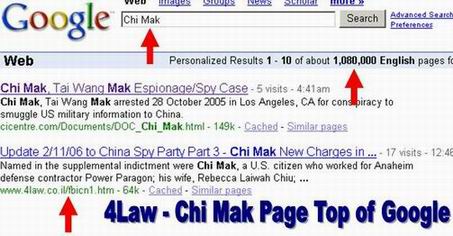 |
|
|
|
Guided Missile Destroyer Secrets Theft by China FBI & NCIS Investigation 11/6/2007 |
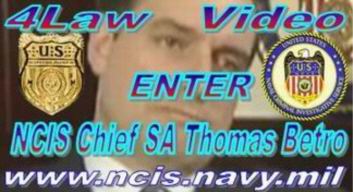 |
|
The court can not get convincing evidence in the FBI publicly "Chinese Espionage" |
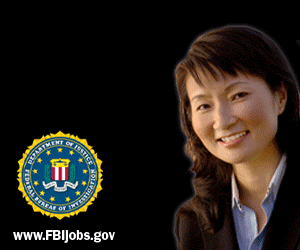 |
| 4Law Last Update June 11 , 2007
The United States Attorney's Office Central District of California June 6, 2007 FIFTH FAMILY MEMBER PLEADS GUILTY IN SCHEME TO EXPORT U.S. DEFENSE ARTICLES TO CHINA SANTA ANA, California -- The fifth member of a
Southern California family who conspired to export United States defense
articles to the People’s Republic of China has pleaded guilty to acting
as an agent of the PRC.
|
 |
| China Tracking Mysterios "A" Submarine Equipped With US Missiles
Note:Google translation of unofficial text transcript of the full original Chinese 10 minutes program video - "Harpoon" is a US Missile all the time. 4Law Basics - An Introduction : Recently, the Taiwan military launched a mysterious "plan" prepared to present two "Sword Dragon" class submarines equipped with the "Harpoon" submarine-launched missiles, to be used in future attacks on the mainland important maritime bases. Taiwan's navy has put the contract to the MD. MD staff will send submarines to Taiwan to understand the situation, coordination and implementation. Well, this mysterious "A plan" including what? "Harpoon" missile capabilities? Missile submarines how to fight the battle? Today's program we have to look into this matter. Explanation : According to Taiwan media, Taiwan navy's submarine upgrade a performance of "A" stepping up. The plan would currently serving two "Sword Dragon" class submarines -- "Dragon" and "Sea Tiger", equipped with the "Harpoon" missiles, to attack the mainland to enhance maritime targets. According to media reports in Taiwan, Taiwan's military has put the development of "A Plan" contract, which was submitted to the United States of MD. "A plan" of the major goals : First, to improve its fire-control system, "Dragon, Sea Tiger "has fired submarine-launched" Harpoon "missile capability, and improve their ability to attack. Second is to enhance the quiet effect was found to reduce the probability of the enemy; 3 is to improve the propulsion system, substantial enhancement in endurance capacity. Taiwan military's combat readiness, "the Dragon" and "Sea Tiger", was bought in 1998 by two Dutch-made submarines. On the end of the 1970s construction, was the world's first a kind of sonar fire-control and navigation propulsion system are integrated into a single system of the submarine. This time, the Taiwan military to give two "Sword Dragon" class submarines equipped with the "Harpoon" missiles is what kind of missiles? It's how kind of performance? China Institute of Contemporary International Relations University, a researcher at : The "Harpoon" missiles is actually the original "Harpoon", the term should be "Whaling's Fork" The missile is being developed by the United States. Developed the first time what is the justification? In the 1967 Middle East war, Israel was a Soviet-made warship missiles to sink. The big boost for the United States, decided on the development of ship-based missiles, ship-borne missiles is. Then from the 1960s research, the success in 1972, start of the 1970s with the American military, have to see whether we now call "Harpoon" missiles. This missile, it is now actually become a more widespread use of a missile. Can be launched by aircraft, fighter fired, or fired surface ships, submarines fired, the so-called multi-purpose, Another all-weather, multi-use areas. This missile with a range of the largest, it now has a range of design, the new model has reached 280 km, Naturally, some reports say 110 km, is actually the largest 280 km. Recently be said to be 11 kilometers, a range of areas. The target of an attack should be said is a target at sea, including ships, drilling platforms and other merchant marine, and other. Commentary : According to the plan, two "Sword Dragon" class submarines, to be equipped with a total of the number of "Harpoon" missiles? China Institute of Contemporary International Relations researcher Yang Mingjie : it is now a target the United States was prepared to buy about 60, of course this is a preliminary information, With the future after the completion of the entire conversion may buy more. But few of these pieces of view, the main target of the attacks, is to achieve the greatest goal is a destructive fighting, The so-called destructive, is aimed at the mainland's transport fleet, including civilian targets at sea attacks Of course, one can not rule out a military target. Commentary : every one missile so destructive, lethal reach? China Institute of Contemporary International Relations researcher Yang Mingjie : This Generally speaking, if a missile, from the previous war situation can be sunk, was fired from the air or fired from surface ships, sunk one around about 3,000 tons of frigates, or general warships could. Of course, a sink is hitting the target, the other one is a chain reaction, a chain explosion, but hit land targets. In fact, it's the real land of the damage is not great. Commentary : Taiwan's current target of the attack, what specific ideas? China Institute of Contemporary International Relations University, a researcher : the idea now, we view from the public, For example, the mainland's 10 cities, it was the plan. We also called against the naval base, he introduced the so-called "three sea", the North Sea, East China Sea and South China Sea. But this I think is too high. More likely, from the current analysis, including its so-called "Sword Dragon-class" of the transformation, in my view, to achieve two aims. One is the psychological effect is called each other understand, I have the ability to carry out sabotage. Secondly, it is a continuation of terror tactics, in the event of military conflict, I do not necessarily to adopt a reasonable and in line with the moral logic of this war, I can tell you the civilian facilities, even on the sea and some other facilities, the so-called dual-use facilities to launch an attack. probably more of a destructive role, rather than a strategic things, I feel is rather rare. Commentary : Taiwan currently has four submarines of the 1970s products, It modern and the most advanced submarines compared to what major weaknesses? China Institute of Contemporary International Relations researcher Yang Mingjie : Its main weakness is a launching platform, launch platform was mainly due to the missile, or object to the launch of this platform is not equipped. Another is its overall combat capability is not very strong. For example, its ability to float, float downward, the mobile carrier, may be affected. Also, it is with some other communications facilities, some of the guidance systems connectivity, Because this area prior to these bottlenecks it is the combat capability of the main aspects. Explanation : According to Taiwan media reports, "Hai Sea Tiger," the design of the submarine's upper end of the 1970s, mainly highlights the shallow-to-ship attack, but after 20 years of wind and rain, the water invasion, and combat effectiveness has been deeply affected. Meanwhile, as a European model of the submarines, and the United States for the "Harpoon" missiles on the existence of compatibility problems. Taiwan's armed forces in 2003 during the "Hankuang 19" exercise, on any "Sword Dragon-class" submarine-launched torpedoes lost control, to observe military exercises, the Taiwan's Chen Shui-bian and other senior hurried evacuation of the rostrum. Critics say Taiwan's attempt to "Sword Dragon" class submarines equipped with the "Harpoon" missiles on the mainland to achieve "pre-emptive" war was not reality. Taiwan is a kind of analysis, according to the island's topography, it will face the greatest threat of attack from submarines, It therefore made some arrangements, including the so-called "island's defense tactics." Well, this is a tactical what kind of meaning? China Institute of Contemporary International Relations researcher Yang Mingjie : It is the tactics, "the island's defense." It is also called the "three-dimensional anti-submarine." The "three-dimensional anti-submarine," is what? Including distance, it is early warning aircraft, submarines is the right monitor. Then the short-range, anti-submarine helicopters it, and then there is a surface ships, surface ships now mainly rely on its second-generation warships, 21 second-generation warship, is the main anti-submarine frigate, Meanwhile, it has now been equipped to achieve, and is the size of 10 a submarine fleet. This anti-submarine, it is a war, is the so-called anti-submarine warfare concept, but implementation will have a certain degree of difficulty. What is the main difficulty? 1, although some of the Taiwan Strait waters here, it should be said that the waters are relatively shallow, but in its northern, southern, These three eastern regions trenches, or the sea some special geographical structure, is actually easy to sneak into the submarine. If it emerged in the case, it is the unfolding of the operations group at least, it should be said that the three face, does not include the four other some of the activities in Taiwan, such an island, its entire battle group not yet reached this operational capability. Commentary : "Harpoon" missiles, or what might be called "whale fork" missiles, it is already widely used, as in aircraft, submarines, we can undertake such a load. Taiwan's current production of "Harpoon" missile capability? China Institute of Contemporary International Relations researcher Yang Mingjie : (Taiwan) can not produce it, or the United States. Now there are about 20 countries and regions in the United States have purchased the "Harpoon" missiles, and in several battles, also have been through the experience, it was the hit rate was 95%, of course, because it really is not much use. One was in the United States to attack Libya when it is through the air-launched, destroyed a Libyan called "Warrior" of such a frigate. Then there was the time, during the Gulf War, Saudi Arabia, is fired from a ship missiles, Iraq to attack maritime targets, the two are successful. Moreover addition, the United States now, MD also developed the so-called "Harpoon" missiles and new types of the new version, constant development, because the highest designs, in fact it has already reached the range of 280 km, said it was now nearly 300 km, because it is a missile export control issues, which may reach 280 km is already high. Commentary : Taiwan with the number of "Harpoon" missiles? China Institute of Contemporary International Relations researcher Yang Mingjie : its Air Force and Navy are combined, It was probably the statistics are more than 290 pieces, such a number. But this number, which is actually the "Harpoon" missile is equipped with its F-16 fighter on. Moderator 1985 : Since the submarine appeared after Such hidden in the depths of the ocean underwater pioneer on the battlefield so that the ocean is full of triggers. Taiwan troops to active duty installation of the submarine missiles, assault, the purpose is worth the world's attention. Well, thank you for watching your Qi Ying auspices of the "southern" time, the audience for next week Goodbye! . |
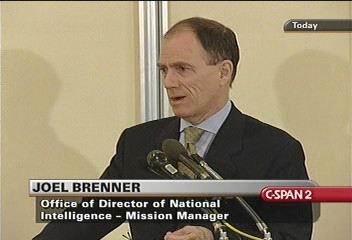
"This compromise is not small
potatoes. It shortens by years the technological advantage of the U.S.
Navy. It degrades the Navy’s deterrent capability in the Taiwan Strait."
|
|
10/5/07 Jury Convicts Chinese-Born Engineer Chi Mak of Passing U.S. Military Secrets to China |
| 4Law Basics - 5 members of a family accused of scheming to send sensitive information about Navy warships to China were indicted on conspiracy charges. The indictment - counts of conspiracy to export U.S. defense articles to China, possession of property in aid of a foreign government and making false statements to federal investigators to existing charges Named in the indictment were Chi Mak, a U.S. citizen who worked for Anaheim defense contractor Power Paragon; his wife, Rebecca Laiwah Chiu; his brother, Tai Mak; Tai Mak's wife, Fuk Heung Li; and their son, Billy Yui Mak. An engineer & ChineseTelevision Director are among 5 people indicted on charges of stealing secret documents on Navy warships and trying to smuggle them again to China. China received ship data hidden in music files for years. Documents about warships, including some being built in Newport News, were passed on to China. Chi Mak took computer documents to his brother Tai, then he encrypted the files and made them look like music files on compact discs. The PRC agent is Pu Pei Lang, a researcher at the Chinese Center for Asia Pacific Studies (CAPS) in Zhongshan Uuniversity in Guangzhou. Some of the documents found sensitive U.S. Navy technology on aircraft carriers and submarines being built at Northrop Grumman Newport News, hundreds of sensitive documents about ship technology about nuclear reactors and electrical distribution systems on Virginia-class submarines, Those subs are now being built jointly by Northrop Grumman Newport News & General Dynamics Electric Boat, in Groton, Conn.Other papers found pertained to systems that were being developed for the next-generation aircraft carrier, the CVN-21. Those include a new plane-launching system that uses electromagnetic rather than steam-driven catapults to send a fighter jet off the flight deck. They also included the advanced arresting gear, the system of cables designed to help the planes return.they were passing information about: the electrical distribution system for Virginia-class subs , circuit breaker systems for Virginia-class subs , electromagnetic launch systems for aircraft carriers , the Aegis radar system used on Navy destroyers ,reports on Navy battleship survivability. FBI/LA Notice.Officials once said they had broken a major Chinese espionage ring. But it has morphed into an export-law prosecution.Jury convicts Chinese-born engineer Chi Mak of passing U.S. Military secrets to China in May 10, 2007. |
 |
 |
| Engineer in China case convicted
Chi Mak, who worked for an Anaheim company, conspired to pass sensitive military documents. By H.G. Reza, Times Staff Writer
A Chinese American engineer was found guilty Thursday of conspiring
to send information about U.S. Navy technology to China that would make
it easier to detect U.S. submarines.Chi Mak, a naturalized citizen, was
convicted of conspiracy to violate export control laws, attempting to violate
export control laws, acting as an unregistered agent of the People's Republic
of China, and lying to the FBI.After six weeks of testimony in U.S. District
Court in Santa Ana, the jury deliberated less than three days."We were
confident about this case from the start," said Assistant U.S. Atty. Gregory
W. Staples.Prosecutors described Mak as a sleeper agent who began preparing
for his assignment in the U.S. in the 1960s, when he moved from China to
Hong Kong, then a British colony. Federal agents said Mak admitted sending
military-related documents to China and they found thousands of pages of
the files in his home. "To the extent that there is Chinese espionage going
on in the United States, I hope [the conviction] sends a strong message,"
said Assistant U.S. Atty. Craig H. Missakian.Defense attorney Ronald Kaye,
saying Mak is a loyal American, accused the government of overstating the
facts. He also accused prosecutors of using xenophobia to get a conviction."It's
a sad day for our country when fear of the foreigner was the means by which
the government was able to obtain a guilty verdict," Kaye said.Mak's conviction
gave a boost to federal prosecutors who had suffered setbacks in two high-profile
cases involving naturalized citizens accused of spying for China. Critics
in the Chinese American community said Katrina Leung and Wen Ho Lee were
singled out because of their ethnicity.Leung, a businesswoman and activist
in the Southern California Chinese community, was an FBI informant accused
of being a Chinese double agent. Those charges were dropped, and she pleaded
guilty in 2005 to lying about a sexual affair with an FBI agent and filing
a false tax return.Lee, a Los Alamos National Laboratory scientist, was
accused in 1999 of stealing nuclear secrets for China. He pleaded guilty
to the lesser charge of mishandling classified computer files. Last year,
the U.S. government and five news organizations, including the Los Angeles
Times, agreed to pay Lee $1.65 million to settle a lawsuit alleging that
his privacy had been violated by leaks that portrayed him as a spy.Mak,
who is being held without bail at Santa Ana Jail, smiled and hugged his
attorneys when he walked into the courtroom Thursday. When the verdict
was announced, he quietly lowered his head, not saying a word. One of his
attorneys, Marilyn Bednarski, rubbed his back."This was a tough case, a
difficult one," U.S. District Judge Cormac J. Carney told jurors. He also
told them not to discuss the classified information they had reviewed.
"You take it to your graves, so to speak." Sentencing was set for Sept.
10. Mak, 67, faces a maximum of 45 years in prison. His wife, brother and
sister-in-law and their son also have been charged in the case and will
be tried next month.
|
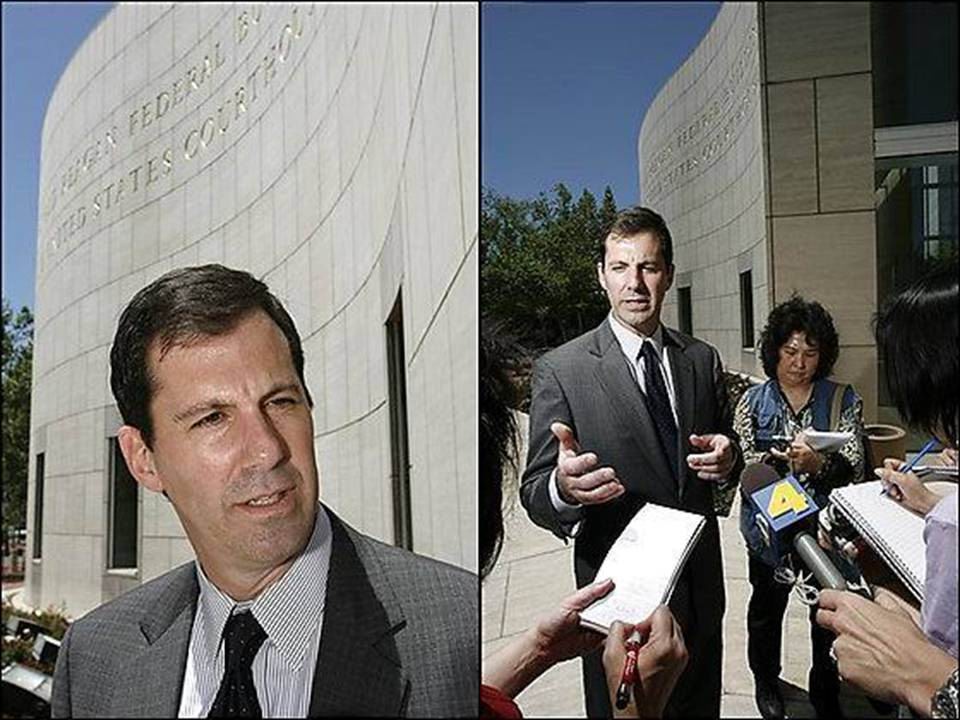 |
| Assistant U.S. Attorney Craig Missakian speaks to reporters after a jury convicted Chi Mak, a Chinese-born engineer, of conspiring to export U.S. defense technologies to China and being an unregistered foreign agent in the Federal Courthouse in Santa Ana, Calif., Thursday, May 10, 2007. Mak worked on submarine technology for an Orange County defense contractor. (AP Photo/Mark Avery) |
|
|
 |
|
|
 |
| Downgraded O.C. 'spy' case goes to jury
Officials once said they had broken a major Chinese espionage ring. But it has morphed into an export-law prosecution. By H.G. Reza, Times Staff Writer
The counterespionage operation was authorized by the top-secret Foreign
Intelligence Surveillance Act court. FBI agents snapped photos of one suspected
spy with cameras they had hidden in his house and mounted on light poles
across the street and in his company's parking lot.In fall 2005, authorities
dismantled what they said was a family spy ring that had been sending U.S.
military secrets to China for two decades. Two alleged spies were arrested
at Los Angeles International Airport before they could board a midnight
flight to Guangzhou with encrypted information about U.S. warships.The
arrests were followed by media reports fueled by government leaks that
billed the investigation as a major espionage case. But what began as a
spy thriller has morphed into a mundane prosecution of violations of federal
export control laws. At the center of the spy ring, said the FBI, was Chi
Mak, a naturalized U.S. citizen and electrical engineer at Anaheim-based
Power Paragon Inc., a firm that works mostly on Navy contracts. The FBI
monitored him for about 18 months with cameras, wiretaps and microphones
hidden in his car and work cubicle.Mak is charged with conspiracy to violate
export laws, exporting or attempting to export military information, acting
as an agent of the Chinese government and lying to the FBI. He is the first
defendant to be tried. After six weeks of testimony in U.S. District Court
in Santa Ana, the case was sent to the jury Monday. Mak's wife, his brother
and sister-in-law and their son are still facing charges. Mak was arrested
with great fanfare Oct. 28, 2005.In early press accounts, anonymous security
and intelligence officials said the damage allegedly inflicted to national
security by Mak and his relatives could equal the harm done by John A.
Walker Jr. and his family of spies, who supplied Navy communication codes
to the Soviet Union for 17 years until they were stopped in 1985. Some
counterintelligence officials privately suggested that his access to classified
programs could severely compromise the Navy's strategic advantages.
|
 |
| Prosecutor tells jury defense engineer hid connections with China
By Jeremiah Marquez , The Associated Press
SANTA ANA – A Chinese-born engineer who worked on U.S. naval technology
sought to give China information on propulsion of future submarines, a
federal prosecutor said Monday in urging jurors to convict the defendant
of conspiring to export defense materials and other crimes.“The defendant
was spying for China,” Assistant U.S. Attorney Craig Missakian said in
closing arguments. “This man's life has been defined by one thing and that
is hiding his connection to the People's Republic of China.” Chi Mak, 66,
a naturalized U.S. citizen, has been on trial for six weeks on allegations
that for years he took material from his employer and gave it to his brother
to pass along to Chinese authorities. He could be sentenced to more than
50 years in prison if convicted of conspiracy to export defense material
to China, failure to register as a foreign agent, attempted and actual
export of defense articles, and making false statements. His wife, brother
and other relatives also have been indicted. In his closing argument, defense
attorney Ron Kaye countered that his client had not compromised national
security. The technological information was available at conferences attended
by Chinese academics and students, and wouldn't help the Chinese regarding
Navy submarines, Kaye said. “Speculation, nonsense. This is what they're
trying to tell you because they got nothing,” Kaye told jurors. “Don't
be fooled, don't be scared.” The trial included testimony from FBI agents,
Navy officials, encryption and espionage experts and Mak. Some witnesses
said Mak was hardworking during his two decades in the United States and
was remarkable only for his thrift. He lived in a 700-square-foot home
despite a six-figure salary and once switched hotels to save $2. The government,
however, said Mak's unassuming ways were part of a long-running conspiracy
to take thousands of pages of documents from his employer, Power Paragon
of Anaheim, and send the material to China with the help of family members.
“What the defendant was trying to do in essence was give the Chinese a
guided tour of the engine room of the submarine of the future,” Missakian
said in his closing argument. Missakian disputed the defense claim that
the information was publicly available, saying the Defense Department had
not approved its release.
|
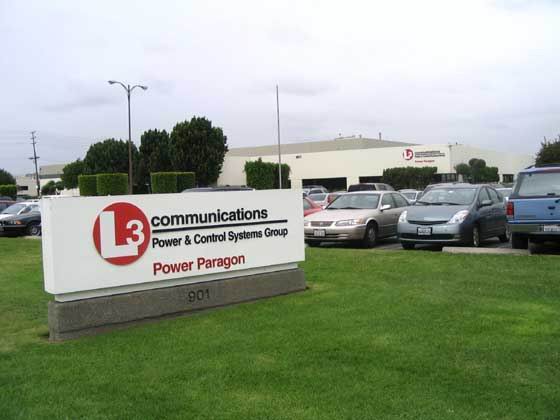 |
| DEFENSE CONTRACTOR: Power Paragon in Anaheim is where Chi Mak was the lead engineer on a sensitive research project involving a type of propulsion used on U.S. Navy warships. (THE ORANGE COUNTY REGISTER) |
| Closing arguments begin in case against Chinese-born engineer
By Jeremiah Marquez , The Associated Press
SANTA ANA – A prosecutor said Monday that a Chinese-born engineer accused
of taking thousands of pages of defense technology documents attempted
to give the Chinese “a window into the engine room of a submarine.”
|
 |
| Virginia-class submarine USS Hawaii.The Torpedo Room of USS Hawaii 4/5/07 in Groton, Conn.Members of the media were given a tour of the USS Hawaii, a Virginia-class fast attack submarine, at the Naval Submarine Base in Groton.The fast-attack nuclear submarine was commissioned during ceremonies at the Naval Submarine Base in Groton 5/5/07.The boat is the third Virginia-class submarine to join the fleet.The $2.5 billion boat is the third in a group of 10 Virginia-class subs being built jointly by General Dynamics' Electric Boat shipyard and the Northrop Grumman shipyard in Newport News, Va.Officials say the class could eventually have about 30 submarines.The Virginia-class submarines are being built to be longer but lighter than the previous Seawolf-class boats.The 377-foot submarine has a displacement of 7,800 tons and can travel at speeds greater than 25 knots, or 28.8 miles per hour. It can reach depths greater than 800 feet and will carry a complement of 134 officers and crew members.The Hawaii's crew will be able to launch Tomahawk land-attack missiles and Mark 48 torpedoes, and can also conduct covert surveillance. It will also be able to deliver mines and map minefields, deliver and support special forces crews and work with other craft for anti-submarine and anti-ship warfare.China received ship data hidden in music files for years of Virginia-class submarines.5 members of a family accused in this case.Some of the documents found sensitive U.S. Navy technology on aircraft carriers and submarines being built at Northrop Grumman Newport News, hundreds of sensitive documents about ship technology about nuclear reactors and electrical distribution systems on Virginia-class submarines, Those subs are now being built jointly by Northrop Grumman Newport News & General Dynamics Electric Boat, in Groton, Conn. |
 |
| Virginia-class submarine USS Hawaii.Tour of USS Hawaii 4/5/07 in Groton, Conn.Members of the media were given a tour of the USS Hawaii, a Virginia-class fast attack submarine, at the Naval Submarine Base in Groton.The fast-attack nuclear submarine was commissioned during ceremonies at the Naval Submarine Base in Groton 5/5/07.The boat is the third Virginia-class submarine to join the fleet.China received ship data hidden in music files for years of Virginia-class submarines.5 members of a family accused in this case.Some of the documents found sensitive U.S. Navy technology on aircraft carriers and submarines being built at Northrop Grumman Newport News, hundreds of sensitive documents about ship technology about nuclear reactors and electrical distribution systems on Virginia-class submarines, Those subs are now being built jointly by Northrop Grumman Newport News & General Dynamics Electric Boat, in Groton, Conn. |
|
|
|
|
|
|
|
|
|
|
|
|
|
|
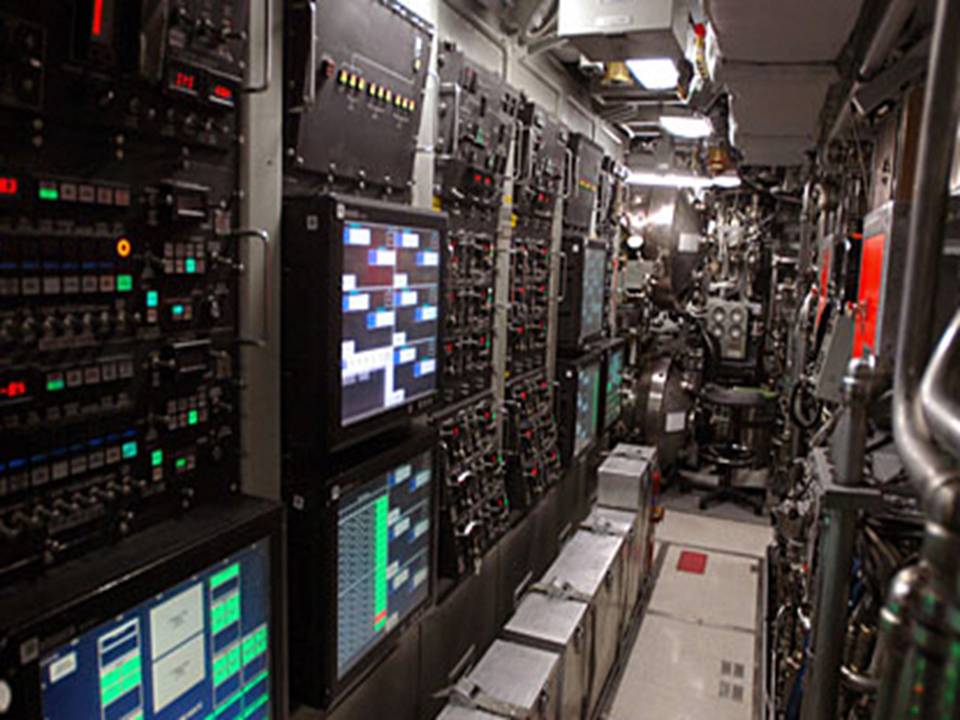 |
| High Tech facilities inside the Virginia-class submarine USS Hawaii 4/5/07 in Groton.After climbing down two decks of the cramped quarters, media toured the sub's control room, which is home to more than 1,000 computers and more than 70 servers. The control room is where the 135-man crew has sonar and fire control.Conn.Members of the media were given a tour of the USS Hawaii, a Virginia-class fast attack submarine, at the Naval Submarine Base in Groton.The fast-attack nuclear submarine was commissioned during ceremonies at the Naval Submarine Base in Groton 5/5/07.The boat is the third Virginia-class submarine to join the fleet.China received ship data hidden in music files for years of Virginia-class submarines.5 members of a family accused in this case.Some of the documents found sensitive U.S. Navy technology on aircraft carriers and submarines being built at Northrop Grumman Newport News, hundreds of sensitive documents about ship technology about nuclear reactors and electrical distribution systems on Virginia-class submarines, Those subs are now being built jointly by Northrop Grumman Newport News & General Dynamics Electric Boat, in Groton, Conn. |
|
|
| Prosecution Challenges Credibility of Accused Spy
By JOSH GERSTEIN Staff Reporter of the Sun
SANTA ANA, Calif. — The prosecution wasted no time yesterday in challenging the credibility of an accused Chinese spy, Chi Mak, who has denied he was trying to aid the Chinese government when he arranged to send disks containing submarine propulsion technology to China."You're a liar, aren't you?" a prosecutor, Gregory Staples, said as he opened his 90-minute cross-examination of the defendant."No," Mr. Mak said calmly.Mr. Staples went on to suggest that Mr. Mak, an electrical engineer who worked for a Navy contractor, Power Paragon, lied repeatedly after his arrest in October 2005, as well as on an immigration form and an application for a security clearance to handle classified information.Mr. Mak conceded that he lied to the FBI and a Navy investigator about how often he had traveled to China, but he said his answers to other questions were simply "not complete." For instance, Mr. Mak now maintains that the disks were intended for two academics in Hong Kong and a family friend in mainland China. However, at his initial interrogation, he mentioned only one of the Hong Kong professors."I still don't believe I lied," Mr. Mak said of the omission."You just admitted to almost a dozen lies you told," the prosecutor said at one point.Mr. Mak has said some of the misstatements came because he was scared and confused by the circumstances of his arrest. He said he was in bed when the FBI arrived at his home and he was taken out of his house initially wearing just underwear. The defense has also noted that the interrogation continued late into the night and that agents lied to Mr. Mak about what was on the disk they found when his brother and sister-in-law were arrested the same night as they prepared to board a flight to China."They were pushing me that night," Mr. Mak said. He insisted yesterday that he has no idea why his brother used a program to reduce the three disks of technical information to one and placed the disk among a set devoted to learning English."Why would he compress it down to one disk and hide it?" Mr. Staples asked."I'm not aware," Mr. Mak replied. He said he saw nothing wrong with sending the papers to China because they had been presented at public conferences attended by foreigners.Mr. Mak said he omitted some relatives from his security clearance application because he had also left them off an immigration form he filled out years earlier. "I want to keep consistent. They have no relationship with my work," he said."Once again you lied to get a benefit?" Mr. Staples said.Mr. Mak replied that he never wanted to handle classified information, but one of his supervisors said it would benefit the company if he could work on such projects. "I'm not interested in security clearance," he said. "I had no reason to lie."Mr. Staples expressed incredulity at some of Mr. Mak's answers, but raised his voice only occasionally. The prosecutor, who is broadshouldered and stocky, seemed to be taking care not to engender sympathy for the defense by intimidating Mr. Mak, 66, who is slight and testified that he weighs less than 140 pounds. The relatively brief cross-examination and the lack of fireworks also seemed intended to suggest to jurors that Mr. Mak's testimony was so implausible that it should be dismissed out of hand.Some of the most damning evidence against Mr. Mak may be notes found in his home and his brother's home, containing what seems to be a series of coded phrases. One phrase, "send a card," appeared next to the words "help your mother in law." Mr. Mak testified Wednesday that he got the list from his niece who said it could be used to communicate about her ailing mother in China without upsetting people.However, Mr. Staples pointed out that some of the entries do not seem to pertain to a sick or elderly relative. For instance, "supermarket" appears next to the phrase "good material."Mr. Mak said he considered the list absurd and told his niece so. "The whole thing's ridiculous," he said yesterday. Nevertheless, Mr. Mak conceded, he copied the list by hand and gave it to his brother.Mr. Mak's wife, brother, sisterin-law, and nephew have all been charged with conspiracy to illegally export defense articles. They are set to be tried later.Mr. Mak testified that he does not think his brother is a spy. However, defense lawyers have tried to put some distance between the two men by arguing that their client had no knowledge that the disk would be encrypted and that Mr. Mak's brother misled him about details of the couple's travel plans on the night of the arrest. |
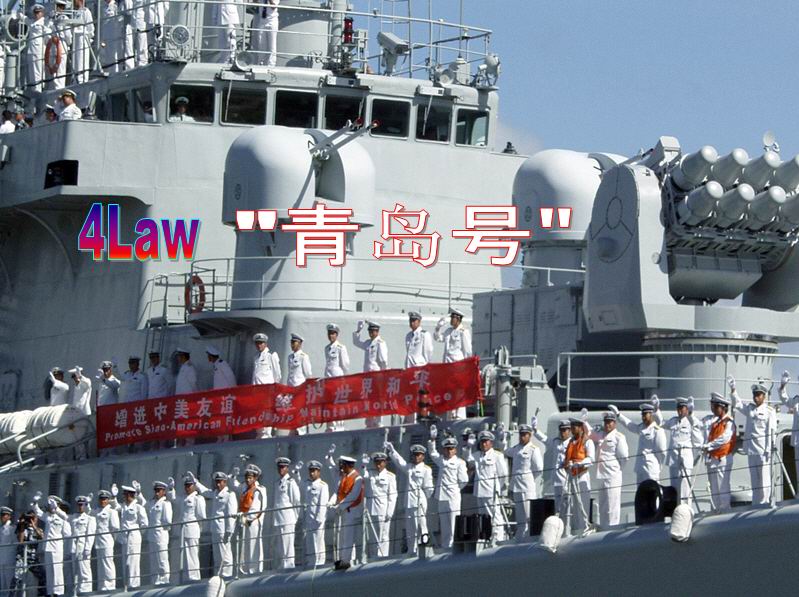 |
| China troops on deck of China's missile destroyer "Qingdao" .Chinese naval vessels visited the United States Navy port of San Diego. September 18, 2006.China's missile destroyer "Qingdao" and fuel tanker "Hongze Lake" visited Haiwaii and California's San Diego. They participated in the first-phase of the first-ever search-and-rescue exercise between China and the United States.San Diego is the United States Navy Pacific Fleet and the largest integrated-base military port .This is the first Chinese naval fleet's visit . |
| Engineer in espionage case admits copying classified documents
By Gillian Flaccus , The Associated Press
SANTA ANA – A Chinese-born engineer accused of conspiring to export
U.S. defense technologies to China acknowledged Thursday on the witness
stand that he copied classified documents from his defense contractor employer
and illegally kept copies in his office. Chi Mak, 66, also acknowledged
during cross-examination that he lied repeatedly to FBI agents during an
hours-long interrogation immediately after his arrest and lied on his U.S.
immigration form years ago.
|
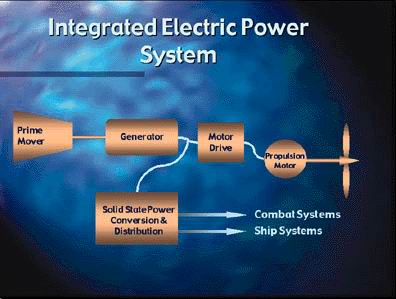 |
| Engineer denies confessing to giving data
By H.G. Reza, Times Staff Writer
The Chinese American engineer on trial for allegedly conspiring to send
U.S. military technology information to China denied Wednesday government
allegations that he confessed to providing sensitive data to his homeland's
military.Under questioning by defense attorney Ronald O. Kaye, Chi Mak
denied telling investigators that he had been sending information to China
since 1983. Prosecutors said Mak confessed while he was interrogated in
the Santa Ana City Jail two days after his arrest.
|
 |
| FBI Frets in Spy Case Over China
By JOSH GERSTEIN Staff Reporter of the Sun
SANTA ANA, Calif. — At the Chinese espionage trial under way in federal court here, there is a constant clattering from the far end of the front row. The sound comes from a rotating team of FBI typists racing to transcribe every word uttered, so the bureau's headquarters in Washington can get a nightly report on the case's progress.They are just a few of the more than a dozen government representatives listening intently in the spectators gallery, many taking copious notes.The FBI has good reason to be apprehensive about its prosecution of an electrical engineer who worked for decades in Southern California's defense industry, Chi Mak, 66. The handful of Chinese espionage cases brought in recent decades have often ended with the government disappointed, or even mortified, at the outcome.How the government will fare with Mr. Mak will not be known until after the jury gets the case next week. However, the parallels between his case and the prior ones are striking, and they illustrate the many challenges involved in combating Chinese intelligence gathering in America."The government has had great difficulty prosecuting Chinese cases," a former FBI counterintelligence agent who testified for Mr. Mak's defense, Ivian Smith, said in a recent interview. His comment was something of an understatement.In 1981, the FBI confronted a Taiwan-born nuclear scientist, Gwo-Bao Min, at an airport as he prepared to travel to China. They suspected Mr. Min was relaying sensitive information to the Chinese from the government laboratory where he worked. He was carrying a notecard that discussed miniaturizing nuclear weapons, but prosecutors deemed the evidence insufficient to bring charges.In 1991, the FBI came to suspect that a physicist who was also born in Taiwan, Peter Lee, was passing military information to China. The probe languished for a time, but picked up again after Lee traveled to China, where he lectured a Chinese group on submarine detection technology he was not authorized to discuss. He ultimately pleaded guilty to two felonies, disclosing classified information and making false statements to investigators. The Navy discouraged bringing some serious charges because a trial could call attention to the fact that some of the data had been declassified.Lee was sentenced to a year in a halfway house. The lenient sentence prompted years of wrangling in Congress about whether investigators and prosecutors mishandled the case.Neither the Min or Lee cases brought the FBI nearly as much chagrin as that of Katrina Leung. In 2003, Leung, who had received $1.7 million as an informant for the bureau over two decades, was arrested and charged, in essence, with being a double agent for China. While the alleged presence of a turncoat among the FBI's so-called assets was worrisome enough, it also emerged that Leung had long-running sexual affairs with two veteran FBI agents, including her own handler at the bureau. A federal judge dismissed all charges against Leung after finding that prosecutors engaged in misconduct. While that ruling was on appeal, Leung pleaded guilty to one false-statements charge and a tax charge. She was sentenced to probation.Investigators say the relatively diffuse methods employed in Chinese intelligence gathering pose a challenge to many prosecutions. While Russian and Eastern European spy agencies were known to rely on a few well-compensated recruits who employed cloak-and-dagger techniques to gather crucial secrets, China tends to seek a broad array of technology by relying on the sentiments and loyalties of Chinese-Americans and Chinese students in this country. One result is that the culpability of those involved can be harder to prove in court, especially beyond a reasonable doubt."You're talking about lots of pointillistic dots you have to connect, which isn't as easy to do as having a videotape of someone making a drop and getting a big chunk of money," a lawyer who prosecuted Peter Lee, Jonathan Shapiro, said yesterday. "Everyone who's ever prosecuted a case involving the People's Republic of China has discussed that issue. What's an open question is will a jury understand it?"Lee argued, as Mr. Mak's defense has, that he was engaged in the ordinary exchange of ideas among scientists. Both men also complicated their prosecutions by arguing that the information was in the public domain or not well-protected. "These trials … basically end up putting corporations and the government on trial for failing to have stringent enough controls over the data," a former FBI counterintelligence executive, Edward Appel Sr., said.One salient fact that has gone undiscussed at Mr. Mak's trial is how the investigation of him began. A reporter for the Washington Times, Bill Gertz, wrote that the alleged family spy ring was fingered by someone in the Chinese security apparatus. Such a person could be an enormously effective prosecution witness, but, to protect intelligence sources and methods, he or she will probably never set foot in an American courtroom."The most incriminating facts about espionage are often not used at trial, including the intelligence that originated the investigation," Mr. Appel said. "The Rosenbergs were executed generations before the full truth was revealed."One China case where the government had considerable success was that of a longtime CIA translator, Larry Wu-Tai Chin. Chin confessed in 1985 to working for a handler in China's Ministry of State Security. However, the former CIA analyst said he was simply trying to improve relations between America and China. A jury convicted him of espionage, but investigators never got the chance to see him sentenced for his crimes. On February 21, 1986, Chin, who was facing a possible life sentence, hanged himself in a Virginia jail cell. |
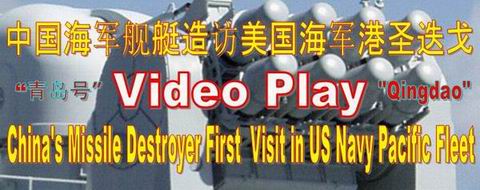 |
| Accused Chinese Spy Testifies in His Own Defense
By JOSH GERSTEIN Staff Reporter of the Sun
SANTA ANA, Calif. — Taking the witness stand in his own defense, an accused Chinese spy said yesterday that he was engaged in legitimate scientific exchange and not espionage when he sent technical papers on electrical systems for American submarines and Navy warships to China."I like to look at some technical exchange," the defendant, Chi Mak, said. "I'm curious to know what's their development stage and I'd like to have their comment on the work."Mr. Mak, an electrical engineer who worked for a California defense contractor, said the papers were intended not for the Chinese government, but for two former academic colleagues in Hong Kong and a family friend in the mainland. Mr. Mak said he saw nothing wrong with sending the papers to China because they were handouts he got at engineering conferences where foreigners were present."All three CDs contained presentation materials that were presented in conferences with international attendees already," Mr. Mak said. Encrypted files from the disks were found in the hand luggage of Mr. Mak's brother and sister-in-law when they were arrested at Los Angeles International Airport in October 2005 as they prepared to fly to China.With those key questions out of the way, a defense attorney, Ronald Kaye, led his client through a lengthy discussion of his education and the years he spent working in a Hong Kong tailor shop before immigrating to America. The prosecution contends that his history has many of the hallmarks of an intelligence agent, but Mr. Mak testified that his journey to Hong Kong from the Chinese mainland in the 1960s was due to a severe bout of rheumatism and that his interest in American military ships was a natural byproduct of the tailoring business.Mr. Mak said he came to America to "seek higher power," meaning work on more sophisticated electrical systems. He acknowledged omitting two of his siblings from an immigration form but said he had no nefarious intent.The defense painted their client as an introverted pack-rat who obsessively gathered and analyzed data, even plotting his projected Social Security income on a graph.Mr. Mak said he never sought out defense-related work and did none of it for about a decade after arriving in America. He acknowledged that he stored thousands of power-engineering documents at home, but said such practices are common. "This is a tradition almost with every engineer," he said.None of the documents investigators found at Mr. Mak's home were marked as classified, but some were designated as "NOFORN," meaning they could not be given to foreigners. Mr. Mak said he was unaware of a policy against taking those home. "I don't think it's practical," he said. "Marketing and even my boss encourage us to work at home."Mr. Mak is expected back on the witness stand today. He has not yet explained documents found at his home that the government says are "tasking lists" specifying the kinds of technology China wanted to acquire. Four members of Mr. Mak's family are also charged and face a separate trial, but a retired FBI agent, Ivian Smith, testified for the defense that such family-based spying is unheard of with the Chinese. "There's not a single instance anywhere," he said.Mr. Smith, who once headed the FBI's counterintelligence program focusing on China, said Chinese who study in America or migrate here are expected to help the Chinese government, but that doesn't mean everyone who gets such requests is a spy. The ex-agent also said a spy probably would not give up his job at a military contractor and move to a purely commercial firm, as Mr. Mak once did. "I can't imagine anybody in Beijing would be very happy if they went back there and said, ‘My source had an opportunity to have access to classified information and declined,'" he said.A prosecutor, Greg Staples, said Mr. Smith's experience with Chinese espionage was fleeting and came about two decades ago. "Your career working Chinese intelligence was really more like a 50-yard dash," the prosecutor said."I wouldn't agree with that," Mr. Smith replied. The New York Sun played an unexpected walk-on role in yesterday's proceedings when Mr. Staples challenged Mr. Smith about an interview he gave in March, after the defense said it planned to call him. "I'm not naïve. I expect the government to try to beat me up a little bit," the former agent told the Sun. "To disagree with the government is parallel to calling you treasonous.""That's a little melodramatic," Mr. Staples said yesterday. "Who in the government called you treasonous?""Some of my former colleagues," Mr. Smith replied, though he acknowledged that no current officials had threatened him.The prosecutor also suggested that it was improper for Mr. Smith, as a witness, to have spoken with the press. The former agent said he was aware of no such restriction on retired officials.Mr. Smith did not dispute the quote but said he had not seen the article. "We don't get The New York Sun in Essex County, Va." he said with a chuckle. |
 |
| In Spy Case, Jury Is Schooled in Chinese Grammar
By JOSH GERSTEIN Staff Reporter of the Sun
SANTA ANA, Calif. — A federal jury here is being schooled in the nuances
and ambiguities of the Chinese language as defense lawyers challenge translations
that the government says put the defendant, Chi Mak, at the center of a
long-running Chinese espionage operation in the American defense industry.In
testimony yesterday, a linguist for the defense disputed the FBI's interpretation
of wiretaps and surveillance recordings that the prosecution claims are
incriminating evidence that Mr. Mak was a covert agent.Prosecutors contend
that a phone recording captured Mr. Mak's brother calling his handler in
mainland China and using a code phrase to identify himself as affiliated
with a spy ring called "red flower of North America."
|
 |
| Chi Mak, a Chinese-born and naturalized U.S. citizen, listens to testimony Tuesday, April 10, 2007, in this artist drawing during his trial in federal court in Santa Ana, Calif., of conspiring to send technical military systems information to China when he was working for an Anaheim-based defense contractor. He has pleaded not guilty to charges of conspiracy to export defense material to China, failure to register as a foreign agent, attempted and actual export of defense articles, and making false statements. His wife, brother and other relatives also have been indicted. (AP Photo/Bill Robles) |
| Witnesses: Engineer didn't need approval to export documents
By GILLIAN FLACCUS, The Associated Press
SANTA ANA, Calif. - Testimony in the case of a Chinese-born engineer
accused of stealing U.S. defense secrets revolved Thursday around whether
he needed government approval to export a document on a quiet submarine
propulsion system to China.Authorities believe Chi Mak, a naturalized U.S.
citizen, stole thousands of pages of defense documents from his defense
contractor employer, Power Paragon, and gave them to his brother, who passed
them along to Chinese authorities over a number of years.He was arrested
in 2005 in Los Angeles after FBI agents stopped his brother and sister-in-law
as they boarded a flight to Hong Kong. Investigators said they found three
encrypted CDs in their luggage containing documents on the propulsion system,
which would make U.S. submarines virtually undetectable underwater.Mak,
66, has pleaded not guilty to charges of conspiracy to export defense material
to China, failure to register as a foreign agent, attempted and actual
export of defense articles and making false statements. His wife, brother
and other relatives also have been indicted.On Thursday, the first full
day of the defense case, two employees from Power Paragon's parent company,
L-3 Communications, testified that they were asked to review the propulsion
document after Mak's arrest. They said they were asked to determine whether
it needed government approval to be taken out of the country.Nancy Hindman,
L-3's internal special compliance official, said she reviewed the document
- which Mak himself wrote and presented at a 2004 engineering conference
- and determined that he didn't need a government license to export it.She
testified that initially there was some disagreement between L-3 and Power
Paragon about whether the document contained sensitive information, but
the companies eventually agreed it didn't."Would you personally have a
problem delivering this to the People's Republic of China?" Assistant U.S.
Attorney Craig Missakian asked Hindman on cross-examination.No," she replied.A
second defense witness, L-3 engineer Kenneth Shelly, testified that he
also felt the document didn't contain any threats to American security.
He said Mak's paper didn't contain anything that couldn't be found in graduate-level
engineering textbooks."There's no specifications, there's no design parameters....
He talks about concepts," Shelly said. "There just wasn't enough there."Outside
the jury's presence, Missakian told U.S. District Court Judge Cormac J.
Carney that the government disagreed with L-3's analysis and found that
the document was export-controlled. He asked the judge to exclude Hindman
and Shelly's testimony, but Carney declined.
|
 |
| US District Judge Cormac J. Carney, listens to testimony in this April 2007 artist drawing during trial in federal court in Santa Ana, Calif. Jurors convicted the Chinese-born engineer Chi Mak Thursday May 10, 2007 of conspiring to export U.S. defense technology to China, including data on an electronic propulsion system that could make submarines virtually undetectable. (AP Photo/Bill Robles, File & CNN TV news video aired in April 5, 2007) |
| Prosecutors Reverse Course in China Spy Case
By JOSH GERSTEIN Staff Reporter of the Sun
After complaints from business lawyers and university administrators,
prosecutors on a Chinese espionage case have reversed course, acknowledging
that the defendant, Chi Mak, may attempt to defend himself by arguing that
the military-related reports he sent to China were in the public domain.Mr.
Mak is on trial in Santa Ana, Calif., on charges of conspiracy to export
defense-related data without a license, acting as an unregistered agent
for the Chinese government, and lying to investigators.
|
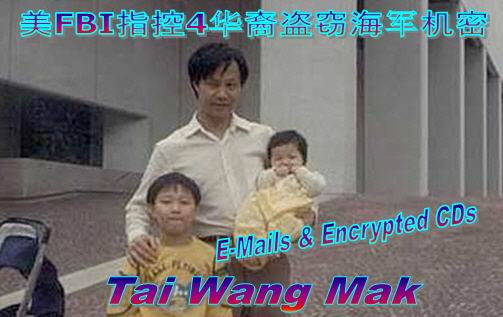 |
| Expert: Seized Disk Had Encrypted Files
By GILLIAN FLACCUS, The Associated Press
SANTA ANA, Calif. - A Navy investigator testified Wednesday that a computer disk seized from the brother of a Chinese-born engineer accused of stealing U.S. defense technology secrets contained encrypted files.Nicholas Mikus, an investigative computer specialist for the Naval Criminal Investigative Service, said the files could only be unlocked with a specific "key," a chain of 113 letters that was stored on a floppy disk.Mikus was the latest witness called by the government in its case against Chi Mak, an engineer accused of passing sensitive military information to the Chinese government for more than 20 years.Mak, a naturalized U.S. citizen who worked for Anaheim-based defense contractor Power Paragon, has pleaded not guilty. He is charged with conspiracy to export defense material to China, failure to register as a foreign agent, attempted and actual export of defense articles and making false statements.His wife, brother and other relatives also have been indicted.Mak, 66, was arrested on Oct. 28, 2005, after his brother, Tai Mak, and sister-in-law were stopped at Los Angeles International Airport as they tried to board a flight to Hong Kong and Guangzhou, China.Investigators said they found a disk in their luggage that contained encrypted files on an electronic propulsion system that would make U.S. submarines virtually undetectable underwater.Mikus said the disk contained a folder labeled "DLL" that held three directories filled with encrypted files. The disk also contained three files containing notes from biology lectures and two files of Chinese music, he said.Mikus did not testify about the contents of the encrypted files but said the encryption was done on Oct. 25, 2005 - three days before the Maks were arrested.Prosecutors have said the floppy disk that contained the "key" was found inside a white envelope in a drawer in Tai Mak's bedside table. Investigators also said they found three disks from Chi Mak that contained the original, unencrypted files that were found on the disk in Tai Mak's luggage.Under cross-examination by the defense, Mikus acknowledged that encryption programs more sophisticated than the one used on the seized disk are available for free or for a small fee on the Internet and also come with Windows Vista.He also said the encrypted files were not "hidden" under the two music files, as prosecutors have alleged.Court papers indicate investigators found documents at Chi Mak's house on the DDX Destroyer, an advanced technology warship, and lists in Chinese asking Mak for information about torpedoes, electromagnetic artillery systems and technology used to detect incoming missiles at his house.Tai Mak has pleaded not guilty to charges of conspiracy to export defense articles, possession of property in aid of a foreign government, failure to register as a foreign agent and making false statements. |
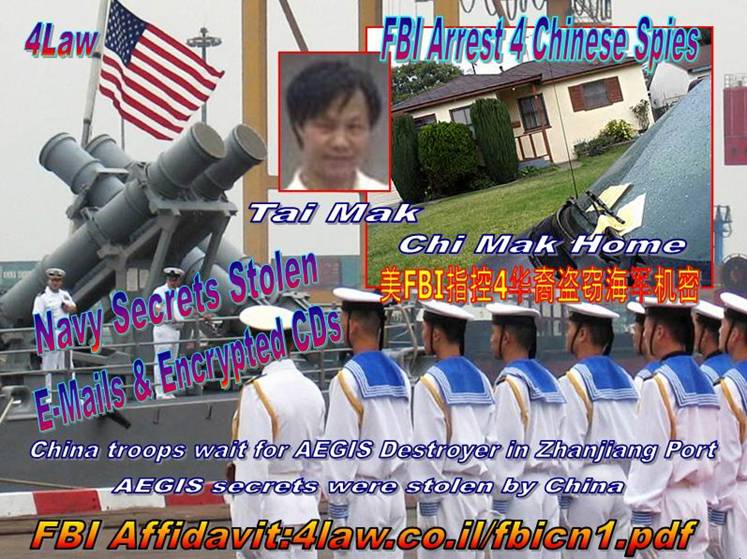 |
| NCIS agent: Engineer admitted passing secrets
By Gillian Flaccus - The Associated Press
SANTA ANA, Calif. — A Chinese-born engineer initially denied passing
military secrets to China with the help of his younger brother, then admitted
the allegations several days later, a Navy investigator testified Tuesday.Gunnar
Newquist, a special agent with the Naval Criminal Investigative Service,
played an hour of excerpts from a 4½-hour interview, secretly
videotaped after the arrest of defendant Chi Mak in which he repeatedly
denied passing sensitive military information to China.“I know your suspicion.
... I did not contact anybody, I did not pass things to people purposely,”
Mak said. “I don’t care if you believe or not believe. ... I’m just telling
the facts.”Newquist said Mak made his confession two days later during
an untaped interview.Mak, a naturalized U.S. citizen who worked for a California-based
naval defense contractor, has pleaded not guilty to charges of conspiracy
to export defense material to China, failure to register as a foreign agent,
attempted and actual export of defense articles and making false statements.His
wife, brother and other relatives also have been indicted.Mak, 66, was
arrested Oct. 28, 2005, after his brother and sister-in-law were stopped
at Los Angeles International Airport as they tried to board a flight to
Hong Kong and Guangzhou, China.FBI agents found encrypted disks containing
copies of documents on a submarine propulsion system hidden in their luggage,
according to court papers.
|
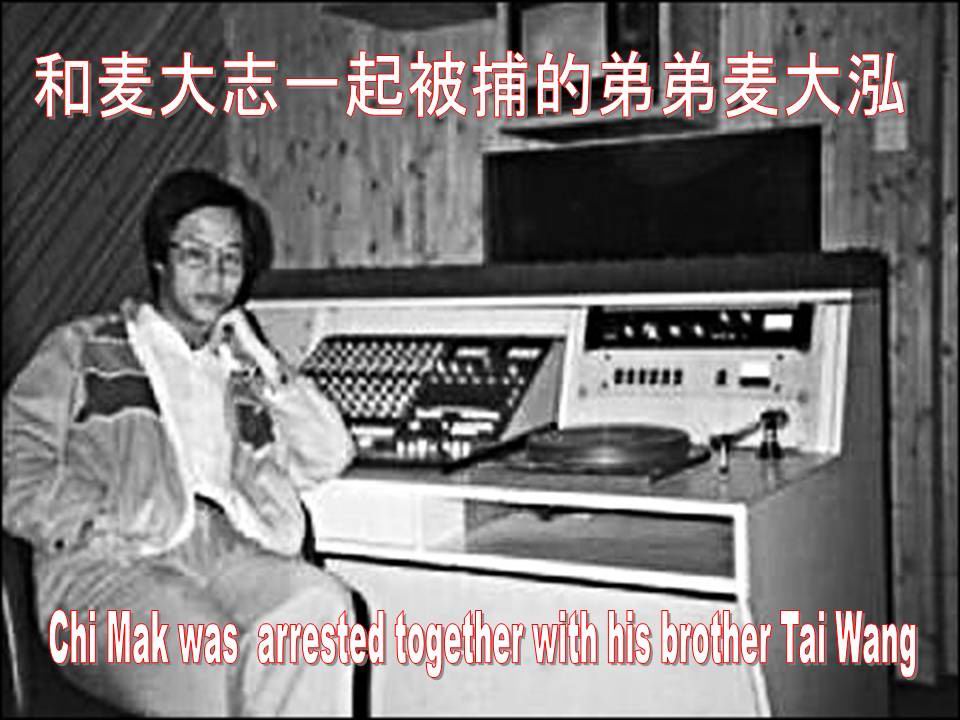 |
| Agent says info on advanced Navy ship found in defendant's home
By JEREMIAH MARQUEZ, The Associated Press
SANTA ANA, Calif. - A federal agent testified Friday that investigators found a computer disk with sensitive details on the Navy's next generation of destroyers when they searched the home of a Chinese-American engineer accused of illegally sending technology information to China.FBI Special Agent James Gaylord said the CD was found at the home of Chi Mak after his arrest and it contained materials related to the so-called DDX, highly advanced guided-missile warships that are under development.The documents were sent by the Navy to companies during contract bidding, including the company Mak worked for, Power Paragon Inc. The company responded to the request but ultimately did not get a contract.The government says a copy of the material was also found on a computer belonging to Mak's brother, Tai.Chi Mak, a Chinese-born naturalized U.S. citizen, is on trial in federal court on charges conspiracy to export defense material to China, failure to register as a foreign agent, attempted and actual export of defense articles, and making false statements. His brother, their wives and a nephew also were indicted and face trial later.The government this week began presenting its case against Chi Mak, who at the time of his arrest in 2005 was working on a project called Quiet Electric Drive, a system to decrease the signatures emitted by Navy submarines and surface warships.Prosecutors on Friday also put into evidence a photo found at Chi Mak's home that showed him, his wife and an official of the China National Nuclear Corporation, an entity Gaylord described as essential in developing China's nuclear submarines.The government also submitted into evidence details about a small calendar book belonging to Chi Mak that contains information about Navy ships that passed through Hong Kong in the early 1970s when he lived there.Gaylord noted that the book contains hull numbers and names of commanding officers associated with the ships.Defense attorney Ronald Kaye sought to blunt the importance of the book during questioning of Erin Lee Abernathy, an intelligence specialist with the Naval Criminal Investigative Service who examined the book.Kaye noted that Hong Kong newspapers at that time regularly published arrival and departure times of ships and that the calendar book included escort and hospital ships among other vessels not specifically designed for battle. |
 |
| Testimony resumes Friday in military secrets trial in Calif.
Mar 30, 2007 12:20 AM
SANTA ANA, Calif.- The FBI said it seized letters, photos and other evidence linking a Chinese-American engineer with a Chinese government official seeking secret information about the space shuttle.Special Agent James Gaylord testified Thursday that federal investigators also conducted extensive electronic surveillance on Chi Mak for 1 1/2 years. Gaylord was scheduled to resume testimony Friday.Mak, a Chinese-born and naturalized U.S. citizen, is on trial on federal charges of conspiring to send technical military systems information to China when he was working for an Anaheim-based defense contractor.He is charged with conspiracy to export defense material to China, failure to register as a foreign agent, attempted and actual export of defense articles, and making false statements. His wife, brother and other relatives also have been indicted.The government of China has denounced the allegations."We have reiterated many times that allegations that China stole U.S. military secrets are groundless and made out of ulterior motives," Chinese Foreign Ministry spokesman Qin Gang said at a news conference Thursday in Beijing.Gaylord testified that the FBI found letters written by a Chinese aviation official to a Boeing engineer named Greg Chung, who worked on the space shuttle program. The official, a representative of China's ministry of aviation, identified Mak as a relative in the letters and sought design information for the "development of the space shuttle," Gaylord said.The official, identified as Gu Wei Hao, wrote he would find a way to pay Chung cash in person for expenses incurred while collecting or purchasing information and said he could channel information through Chi Mak.In a letter that investigators recovered at Chung's Orange, Calif. home, the official noted that the Chinese government was forming a ministry of aeronautics and astronautics industry.According to testimony, the FBI also found a photo of Mak and the official standing in front of Los Angeles' Griffith Observatory and a business card identifying an adviser with the China National Nuclear Corporation - an agency Gaylord said was the rough equivalent of the U.S. Department of Energy.Gaylord said Chung retired from Boeing and later returned as a consultant. |
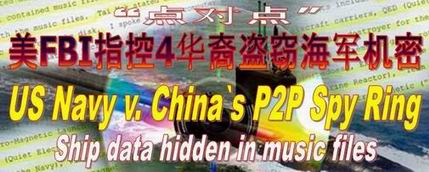 |
| FBI: Letters link indicted engineer to Chinese official
By JEREMIAH MARQUEZ, The Associated Press
SANTA ANA, Calif. - A Chinese-American engineer accused of conspiring
to send information on U.S. naval technology to China had repeated contact
with a Chinese government official who was seeking information about the
space shuttle from a Boeing engineer, according to FBI testimony Thursday.Special
Agent James Gaylord read translated letters that he said were written by
a Chinese aviation official and were discovered during the investigation
of Chi Mak, a naturalized U.S. citizen who worked for a California defense
contractor and who is now on trial in U.S. District Court.One letter dated,
May 2, 1987, was addressed to a Boeing engineer named Greg Chung, who worked
on the space shuttle program. In it, the official wrote: "China is in the
process of discussing and approving for the trunk-line airplanes and planning
and arranging the space shuttle issues. I hope these products will be flying
sky high soon. There are some difficult technical issues that need your
assistance."
|
 |
| Defense attorneys Ronald Kaye, left, and Marilyn Bednarski speak to reporters after a jury convicted Chi Mak, a Chinese-born engineer, of conspiring to export U.S. defense technologies to China and being an unregistered foreign agent, outside the Federal Courthouse in Santa Ana, Calif., Thursday, May 10, 2007. Mak worked on submarine technology for an Orange County defense contractor. (AP Photo/Mark Avery) |
| FBI monitored engineer accused of stealing secrets for China
By JEREMIAH MARQUEZ, The Associated Press
SANTA ANA, Calif. - A U.S. defense company engineer accused of conspiring
to send technical military systems information to China was subjected to
extensive electronic surveillance for 1 1/2 years, though some of the monitoring
was foiled by Southern California freeway noise, an FBI agent testified
Thursday.Special Agent James Gaylord said that at various points between
June 2004 and October 2005 investigators installed wiretaps on engineer
Chi Mak's home and office, put tiny microphones in his house and cars and
placed closed-circuit TV cameras above the dining and computer rooms of
his home in Downey, a Los Angeles suburb.Mak was a member of an elite unit
of engineers at Anaheim-based defense contractor Power Paragon Inc., where,
according to testimony, he had access to or worked on sensitive projects
for the Navy.
|
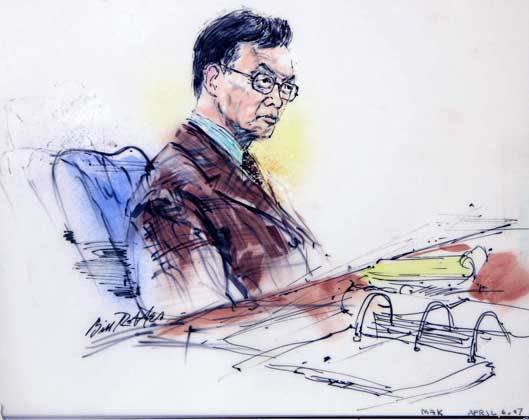 |
| Chi Mak, a Chinese-born and naturalized U.S. citizen, listens to testimony April 26 , 2007, in this artist drawing during his trial in federal court in Santa Ana, Calif., of conspiring to send technical military systems information to China when he was working for an Anaheim-based defense contractor. He has pleaded not guilty to charges of conspiracy to export defense material to China, failure to register as a foreign agent, attempted and actual export of defense articles, and making false statements. His wife, brother and other relatives also have been indicted. (AP Photo/Bill Robles) |
 |
| Defense contractor officials testify in military secrets trial
By JEREMIAH MARQUEZ, The Associated Press
SANTA ANA, Calif. - A defense company engineer accused of conspiring
to send technical military information to China was never given permission
to share sensitive documents on a future Navy warship with his brother,
a security official for the company testified Thursday.Fred Witham, who
oversees security for Power Paragon Inc., was questioned about defendant
Chi Mak's access to a so-called DDX document. The government claims the
document was found on a computer belonging to Mak's brother, who is also
charged in the case.Mak, a Chinese-born naturalized U.S. citizen, went
on trial this week in U.S. District Court.Prosecutors also asked Witham
whether Mak had ever asked for approval to send the DDX document and two
other documents to China.Witham said no but that responsibility for that
would have fallen to another Power Paragon official who oversees export
controls.Power Paragon founder Arleigh Dotson testified Wednesday that
Mak was bright, reliable and successful on the job."He was one of our better
engineers," Dotson said.Mak, 66, was a member of an elite unit of engineers
at the Anaheim-based defense contractor, Dotson said, and as such had access
to or worked on sensitive projects including the Navy's Aegis system, the
survivability of Navy vessels and electromagnetic aircraft launch system.Mak
has pleaded not guilty to conspiracy to export U.S. defense secrets to
China, attempted and actual export of defense articles, making false statements
and failure to register as a foreign agent. If convicted, he could get
more than 50 years in prison.His wife, brother, sister-in-law and nephew
also were charged. Counts against some or all include conspiracy, failing
to register as a foreign agent, possession of property in aid of a foreign
government, and making false statements.The Chinese government denies it
took military secrets."We have reiterated many times that allegations that
China stole U.S. military secrets are groundless and made out of ulterior
motives," Chinese Foreign Ministry spokesman Qin Gang said at a news conference
Thursday in Beijing.In the government's opening statement Wednesday in
Santa Ana, Assistant U.S. Attorney Greg Staples painted Mak as a longtime
agent who had been sending sensitive material to China since 1983, two
years before he became a U.S. citizen. Federal agents asked Mak why he
did it, the prosecutor said."The answer was very simple. The defendant
said, 'I wanted to help China,'" Staples said.Defense attorney Marilyn
Bednarski vehemently denied that her client confessed, calling him a devoted
American who never forwarded material he thought was restricted. One of
the documents in question had even been presented at a public conference
and was available on the Internet, she told jurors.
|
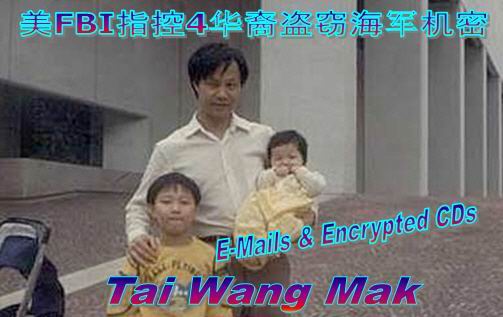 |
|
|
| 4Law Basics - FBI (Comment ) Fooled , Pays Communist Spy nearly $2 million to divulge classified docs. For nearly 20 years, Katrina Leung on the agency’s payroll was instead passing classified information to China. USDOJOIG Report. |
 |
|
|
| Spying Case Tossed Out
The Associated Press Monday, July 18, 2005 LOS ANGELES -- A retired FBI agent who pleaded guilty to lying about his affair with a suspected Chinese double agent was sentenced Monday to probation and fined $10,000 after apologizing for his behavior. Smith pleaded guilty in May to a single count of making a false statement admitting that he had a sexual relationship with Leung and lied about it to the FBI. The government contended that Leung, a paid informant working with him, had access to such information during their affair. The case against Leung, who was charged separately, was dismissed earlier because of misconduct by the government. The judge found that prosecutors blocked Leung's access to the person who would have been her most critical defense witness - Smith. The government has indicated it will ask the 9th U.S. Circuit Court of Appeals to have Leung's case reinstated. Gathering intelligence during her frequent business trips to China -. Prosecutors claimed she was a double agent for China, beginning around 1990. |
 |
| Katrina Leung, right, leaves federal court with her attorney Janet Levine in this Dec. 17, 2003, file photo taken in Los Angeles. U.S. District Judge Florence Marie Cooper dismissed the case against Leung, accused of using a sexual affair with an FBI agent to gain unauthorized access to classified documents, for prosecutorial misconduct Thursday, Jan. 6, 2005. Cooper found that the government had purposely made sure that Leung would not have access to her former lover, James J. Smith, for information regarding her case. (AP Photo/Kevork Djansezian, File) |
|
|
| 4Law Basics
- Dr. Wen Ho Lee accuses also
government prosecutors…another China Accused Spy…800 MB of secret information
"lost" under his hands in Los Alamos….He became a "star" in Chinese TV
program in China...his site today:
His Indictment… - His Site: http://www.wenholee.org |
 |
|
|